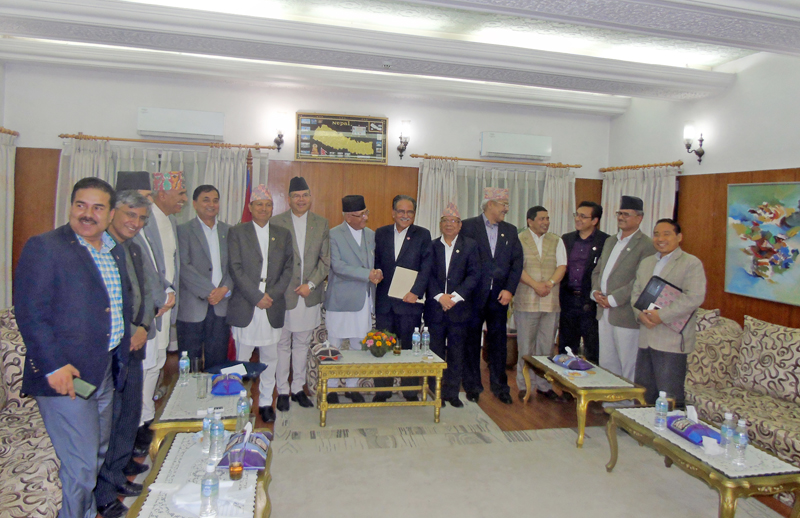Nine-point deal dashes victims’ hope for justice: TRC, CIEDP
Kathmandu, May 17
The recent nine-point pact sealed between the ruling CPN-UML and UCPN-Maoist parties has shattered thousands of conflict-victims’ hope for justice, the transitional justice bodies have observed.
Members and staffers of the Truth and Reconciliation Commission and the Commission on Investigation of Enforced Disappeared Persons are in the field across the country to monitor the complaint receiving campaign that began a month ago.
TRC member Madhabi Bhatta, who returned to Kathmandu after visiting 14 districts of the mid-western region today, said hundreds of victims of Maoist insurgency fear acts of vengeance from the perpetrators, especially after the UML-Maoist agreement.
UML Chair and Prime Minister KP Sharma Oli and UCPN-Maoist Chair Pushpa Kamal Dahal inked a nine-point deal on May 5 that includes immediate initiation of the process to withdraw insurgency-era cases and other politically-motivated cases and clemency to the perpetrators.
“Hoping for justice, we have lodged complaints naming the perpetrators. Unfortunately, the ruling parties have decided to offer them clemency,” said Suman Adhikari, chairman of Conflict Victims’ Common Platform.
After the nine-point deal, nothing stops the perpetrators from targeting the complainants, added Suman, whose father, Muktinath Adhikari, a school headmaster of Lamjung district, was allegedly abducted, tied to a tree and killed by Maoist cadres in January 2002.
CIEDP spokesperson Bishnu Pathak observed that fewer victims were coming forward to register complaints across the country since the nine-point pact.
Pathak, who is visiting districts of the eastern region, said he found that victims living in villages were more fearful of possible revenge from perpetrators if they lodged complaints than those living in urban areas.
It is learnt that only five complaints have been registered so far in Palpa district, while no complaint has been received in Okhaldhunga since May 5.
TRC member Bhatta said the staffers of the district peace committees that have been tasked with facilitating the complaint receiving process were also responsible for the discouraging trend.
“In some districts, I found that DPC secretaries were advising victims against lodging complaints, saying they wouldn’t get due justice,” Bhatta told The Himalayan Times. She, however, refrained from sharing names of such DPC secretaries with media.
CIEDP and TRC began receiving complaints from the victims on April 14 and April 17, respectively. So far 7,476 complaints have been lodged at the TRC, while 1,222 cases have been registered across the country for the CIEDP to probe.
Bhatta and Pathak agreed that the number of complaints was much below expectation. They hoped more victims would complain about their ordeal by mid-June.
Undue surveillance from the security agencies, including the Nepali Army and Nepal Police, about the lodged complaints has also discouraged other victims from filing cases against the perpetrators of the security agencies, according to CIEDP spokesperson Pathak.
Though the Nepali Army and Nepal Police headquarters denied they had directed anyone to collect information about the complainants, Nepali Army battalions and district police officers have asked DPCs to provide information that TRC and CIEDP want to keep confidential until the investigation was carried out.






